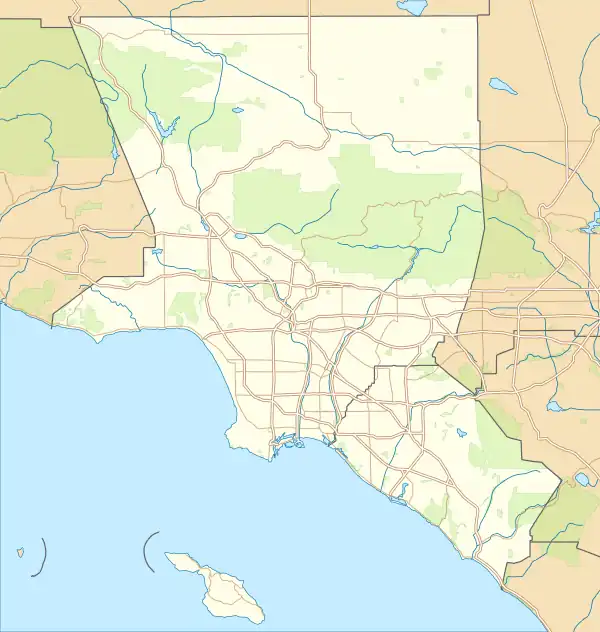| Reid-Baldwin Adobe | |
|---|---|
_Baldwin%252C_the_former_Hugo_Reid_Adobe%252C_at_Rancho_Santa_Anita%252C_ca.1903_(CHS-5178).jpg.webp) The "Hugo Reid Adobe" c. 1903, prior to removal of a wood-frame addition by Baldwin | |
| Location | 301 N Baldwin Ave, Arcadia CA |
| Coordinates | 34°08′27″N 118°03′11″W / 34.1407805555556°N 118.053008333333°W |
| Built | 1839 |
| Designated | April 3, 1940 |
| Reference no. | 368 |
 Location of Reid-Baldwin Adobe in the Los Angeles metropolitan area | |
The Reid-Baldwin Adobe, formerly called the Hugo Reid Adobe, is an adobe house built in 1839. It is located at the Los Angeles County Arboretum and Botanic Garden in Arcadia, California. The Hugo Reid Adobe was designated a California Historic Landmark (No. 368) on April 3, 1940. The Reid Adobe was built by Scottish−Mexican Hugo Reid on the shore of what is now called Baldwin Lake, with the help of local natives.[1] Reid received the full Mexican land grant for Rancho Santa Anita in 1845, which included 13,319 acres of land. Reid farmed some of the land and planted grape vines.[2][3][4]
Hugo Reid (1811–1852), born in Scotland, was an early resident of Los Angeles County who became a naturalized citizen of California (then a part of Mexico) in 1839. He married Barolomea, a respected Gabrieleño woman, who became known as Victoria Reid.[5][6] Born at the village of Comicranga and taken to San Gabriel Mission at the age of six, Bartolomea was married at the age of 13 to an older indigenous man, as arranged by the Franciscan fathers. The couple later were given small plots of land for their work at the mission.
When the mission was secularized, Bartolomea had been widowed and had remarried, to Hugo Reid. As he was not yet a naturalized citizen, she received a land grant in her name alone. Their marriage elevated Hugo's status, as she was a well-connected mission Indian.[7][8]
Elias Jackson “Lucky” Baldwin purchased Rancho Santa Anita in 1875. In 1879 Baldwin added a wooden wing to the old adobe home. Elias Jackson "Lucky" Baldwin (1828–1909) was a pioneer of California business, an investor, and real estate speculator during the second half of the 19th century. He earned the nickname "Lucky" Baldwin due to his extraordinary good fortune in a number of business deals. He built the luxury Baldwin Hotel and Theatre in San Francisco and bought vast tracts of land in Southern California, where a number of places and neighborhoods are named after him.[9]
In 1947 the state and county acquired the land to create an arboretum around the lake and historic Reid-Baldwin structures.[2]
Reconstruction
Without a good roof, adobe structures can be damaged quickly. Even with a good roof, adobe structures still need constant maintenance. The Rancho-Era California Adobe is under repair and reconstruction, with completion expected in 2023.
The original home was built with sun-dried adobe bricks, made with clay soil, water, and straw to add strength. The original adobe home's roof was made of rawhide animal skin used to tie giant cane reeds together. The roof was coated with tar to preserve it. The original reconstruction of the Hugo Reid Adobe tried to use much of the original methods and materials.[10] [11] [12] [2]
Marker
Proposed State Marker for the site reads:
- NO. 368 REID-BALDWIN ADOBE – Reid, a Scotsman, petitioned the government of Mexico to grant him Rancho Santa Anita. His claim strengthened by his marriage to Victoria, a native Indian of the San Gabriel Mission, he received the grant on April 16, 1841. Immediately upon filing his petition, Reid took possession of the land, started to farm and plant vineyards, and built the first house – the Hugo Reid Adobe – in 1839. In 1875, E. J. Baldwin purchased the rancho and in 1879 added a wooden wing to the old adobe.
See also
- Reid-Baldwin Adobe Historical Markers
- Santa Anita Train Depot
- Queen Anne Cottage and Coach Barn
- California Historical Landmarks in Los Angeles County
- List of California Ranchos
- Ranchos of Los Angeles County, California
References
- ↑ "Historic structures of the Los Angeles County Arboretum and Botanic Garden". Arboretum.org. Los Angeles County Arboretum and Botanic Garden. Retrieved June 18, 2017.
- 1 2 3 "History of the Los Angeles County Arboretum and Botanic Garden § Baldwin Lake: Its Origins and History". Arboretum.org. Los Angeles County Arboretum and Botanic Garden. Archived from the original on October 26, 2017. Retrieved June 18, 2017.
- ↑ californiahistoricallandmarks.com, CHL No. 368 Hugo Reid – Baldwin Adobe – Los Angeles
- ↑ Cal Parks, Reid-Baldwin Adobe, 1940
- ↑ "Historic Structures: Hugo Reid Adobe". Los Angeles County Arboretum and Botanic Garden. Los Angeles County Arboretum and Botanic Garden. Archived from the original on 9 February 2014. Retrieved 20 October 2013.
- ↑ Reid, Hugo (1968). "The Indians of Los Angeles County: Hugo Reid's letters of 1852". Library of Congress. Braun Research Library, Southwest Museum, Los Angeles, California. Retrieved August 25, 2018.
- ↑ Raquel Casas, Maria (2005). "Victoria Reid and the Politics of Identity". Latina legacies : identity, biography, and community. Vicki Ruíz, Virginia Sánchez Korrol. New York: Oxford University Press. pp. 19–38. ISBN 978-0-19-803502-2. OCLC 61330208.
- ↑ "City of Arcadia, CA". www.arcadiaca.gov. Retrieved 2023-01-08.
- ↑ arcadiasbest.com, "What or who is Hugo Reid?" July 14, 2009
- ↑ The Patch, "An Emergency at the Arboretum Finally Gets Attention", by Bill Peters, Apr 18, 2011
- ↑ arboretum.org, Strategic Plan 2017–2022 Summary